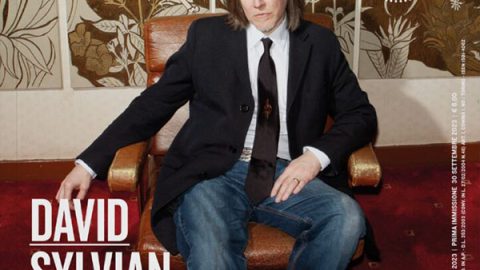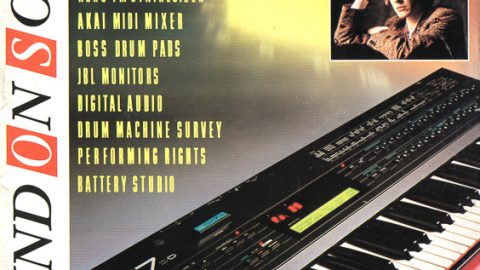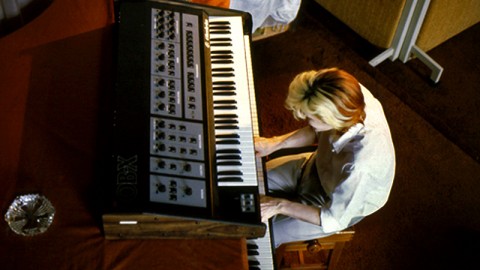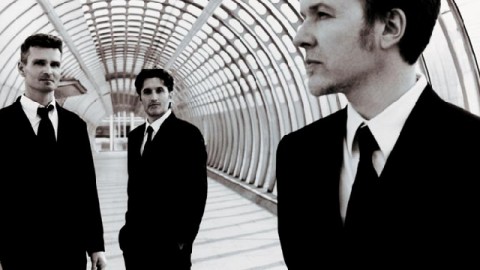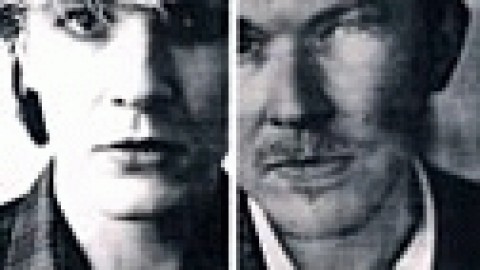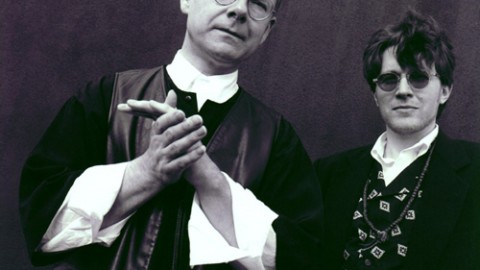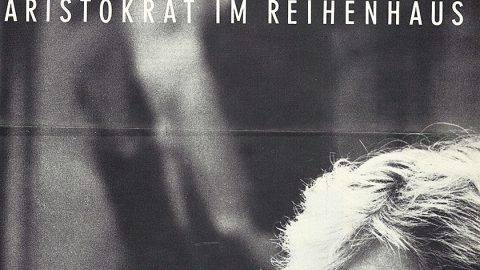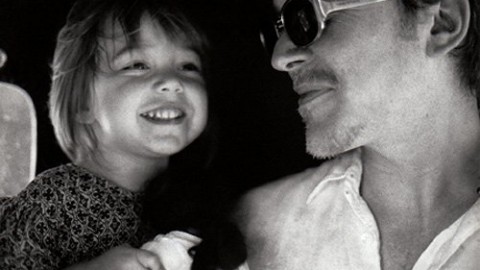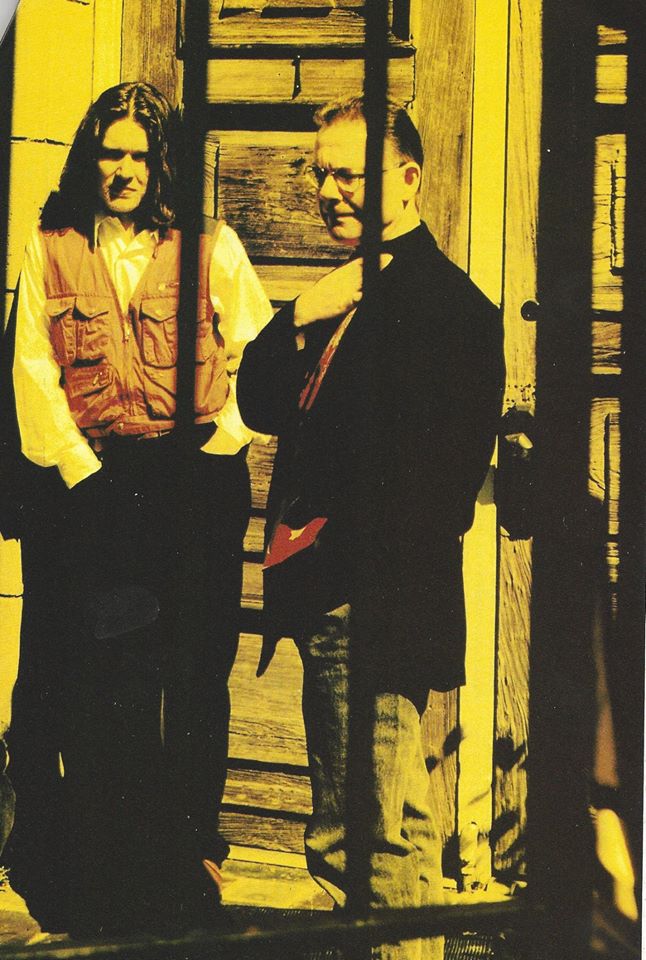
MIRACLES AND GRACIOUSNESS David Sylvian in Glasgow, December 1993
An interview with Bill Drover (with a little help from Robert Fripp)
Bill: First of all, how have you taken to actually doing a concert tour, a large concert tour for the first time for several years?
David: I’m enjoying it. I’m enjoying it more than I’ve ever enjoyed touring before in the past, because I’m working with a group of people that… The chemistry amongst the five of us is very good. The people working behind the scenes are also excellent at their jobs. I’m in good company. So, there’s a good spirit on this tour, which has often been missing on the past tours that I’ve been on. The project with Robert started out as a touring project. As it happened in 92 we toured in Japan and Italy. And this was mainly at Robert’s request that we write material and then we take it out on the road and then we record it. This tends to be the way he prefers to work. It was a new experience for me, so I thought, well, why not, you know. I was interested in touring again. I didn’t particularly enjoy the 88 tour. I think it had a really good band, but we had so many problems going on behind the scenes that we were held back from developing musically, I think, even though we were up to a pretty decent standard. We could have taken things so much further, I felt. There was so much pressure on us, too, that it just kind of held us back. So it was a natural step to, having recorded The First Day, to take it out on the road again but with a larger unit. The material remains reasonably flexible. So, the shows have remained somewhat fresh, you know, as possible as that is in a situation where you’re touring night after night for a period of two to three months. Robert in the background: You tell me, Dave! Laughter
Bill: Have you tried to do any reinterpretation of the songs as you went through the tour? Have you tried to freshen up for yourself, and find new ways of…
David: Um, they loosen up, some of them do. Some of them lend themselves to improvisation more than others. I guess 20th Century Dreaming and Firepower have gotten looser as the tour’s gone on. The aim wasn’t really to rearrange the pieces. Darshan also is one of the pieces that’s quite flexible.
Bill: It’s noticeable on this tour that your older tracks actually have got lyrics. Are you consciously trying to do more lyrical work now, after having done the ambient albums, etc.?
David: I’ve never abandoned the vocal work. It’s always been very, very important to me. I would say it takes precedence over the instrumental work, and it always has done, but it hasn’t appeared that way to the public because of the sequence in which the records were released. Working with Holger, the first album, Plight and Premonition, came about more or less by accident. It wasn’t a planned project. I just happened to be in Cologne at a certain point in time, when that record came about, in a matter of three days. Flux and Mutability similarly came… We were prepared to record an album at that time. But it’s two weeks work. They were very low budget records, and they were both projects I enjoyed getting involved in, but they didn’t take a lot of my time, you know. With Rain Tree Crow, I wanted to mix the instrumentals with the vocal work, primarily because I saw the benefits in working with that particular constellation of musicians again in drawing out performances from those musicians which I hadn’t heard on their own projects and which I knew that they were more than capable of. I think on their own projects they were working on they were concentrating more on solo writing than maybe performances- intrumentalists–so it was I thought a good opportunity to explore instrumental material with that particular set up, something we’d always wanted to do so it seemed natural. And I actually think the instrumental pieces are what justify that recording, in that they show the four of us improvising together on an equal footing, developing language which was uniquely our own at that point in time. The songs, which I also like very much, I can see as structurally probably related to my past solo work, because I was in control of the structuring of those pieces, more so than the instrumental pieces. But nevertheless, I’m interested in both extremes and I intend to pursue both avenues in the future.
Bill: It was unfortunate … it was very acrimonious–the Rain Tree Crow project, at the end. Did that surprise you or upset you that this attitude was coming from some of the lads after it?
David: It disappointed me. First of all, I was surprised in the first instance. Secondly, I was disappointed. I didn’t think it was necessary to air all this in public. A lot of it was untrue anyway. And I regret it on the level that the album was made with a great deal of love, passion, excitement, right up until the latter stages of…well, the recording was completed before we started to fall out, so we were in the mixing stages. So the quality of the music is very positive. It’s very passionate work. And I still feel that way about it. There’s no way that that could have been diminished in any way, because I mixed the tracks with Steve and I tried to just remain true to everybody’s original wishes regarding the mixes. And I know that everybody in the band was happy with it. They were asked after the album was completed. So as far as the work goes, everybody was happy. And everybody was aware that we’d made a decent record, I think. But somehow they found it necessary to put this negative press out and I think that created this aura around the album and people didn’t really want to touch it, And…. Robert in the background: You don’t have to answer that question if you don’t want to! D: (laughs and yells back) Thank you, Robert!
Bill: It’s unfortunate that you’ve got this image of being a power freak, that you want total control and no one else is really to have an input into it.
David: Yes, well that image has mainly come through my work with the boys in the band, you know. I’d have to go on record and explain as to why they feel that way about me and I’m not prepared to do that, because that would mean I’d have to point out certain, whatever, you know weaknesses of theirs, and I’m not prepared to do that. They’ve tended to need some kind of guidance in the past, and I think now, having come through the Rain Tree Crow experience, they’re far more determined to make something out of their work. They’ve sat around for a long time expecting other people to help them out and to do something for them and now I think they’re taking a much stronger step in making something happen for themselves, and now the work is reflecting that.
Bill: To a certain degree do you think in actual fact you almost need one person to take control of a project, of an album, for it to come out. That really, with several points of view, you end up getting a happy medium but not really an album with a direction?
David : It’s difficult with a group. It’s difficult with a group, that’s true to say, you know? If too many disparate elements are involved and opinions and so on, then, yes, the power of the work’s dissipated enormously. I found in the Rain Tree Crow project that there wasn’t a great understanding of the material, there was always somebody in the band that wasn’t convinced by a particular track, and therefore there was a lot of sitting down explaining going on, you know, talking about the direction of the piece in relation to known pieces of music, where it should go, and so forth. So there’s a lot of patience required in that respect. Whether leadership is needed–I didn’t start out, for example, as the producer of the project. We started out with Michael Brook as the co-producer of the project, and we just found that we didn’t need a co-producer. Michael graciously agreed to step down from the situation. But, then, more or less, I was labored with the production, it wasn’t something I wanted to take on. I would gladly have given that up if somebody else was capable of taking over at that point in time with that material. I didn’t feel that anybody else was. And everybody trusted me, had a lot of faith in me. I mean Mick went as far as to ask me to produce his next album as a result of the job I did with Rain Tree Crow, before whatever happened and he decided that, you know, I’d stabbed him in the back or whatever. It’s all very complicated and not very pleasant. Um, I just regret that it had to come out in the open as it did, because a lot of it was completely unnecessary and fabricated.
Bill: I know there was a lot of confusion with the fans that had been a long time watching your career and the others’, and, you know, through Bamboo especially, we were getting all these reports back from the other members of the band saying you’d taken control of the video and they wanted to know what was happening. It upset us. And then of course Medium sort of took over and the runners of the fanclub then joined up with the other lads to do this new label, which has sort of left a lot of us sort of wondering what was really happening here. And we’ve just been taking radio interviews from you since then (David- mmm) to see what you were doing. With regards to the new album with Robert, does a lot of the tracks you’re doing live, mainly the slower tracks–I mean, “The First Day” especially seems to get a very good reaction from the crowd… why were they not put on this album and are we going to get them out Iater?
David: They didn’t work in the context of what The First Day eventually became, and so therefore we put them aside for a later project. So, yes, they will surface eventually.
Bill: So we will get things like Ascension, etc.
David: Ah, no. No we won’t. I can see damage surfacing… I should imagine a lot of the material we were performing on the first tour will go unrecorded except on the many bootlegs that are available.
Bill: Yes, we’ve all sort of got a copy of that! And proudly owning it. Right, what next? Right, next slightly more into your personal life. You’ve just become a father. The roadies; have been telling us they hardly ever see you because you’re always dashing back to be with Ingrid and the kid. Is this affecting you? Do you think a lot more–you know everybody always says that becoming a Dad is always a very special thing. Do you see it affecting you. Do you find spontaneous lyrics coming into your head about it?
David: (growing quiet) Ah, no. No.
Bill: Were you there at the birth?
David: Yes.
Bill: You were?
David: Yes, it was an amazing experience for … all three of us! (laughs) It was a truly amazing experience, and it’s wonderful to be a father, and to be so in love with a child in the way that I feel towards Ameera. Is it changing me? Yes, it is. Um, but the process is slow. You can see the changes taking place, and you can see a lot of your shortcomings, and you can see what work needs to be done, because you’ve taken on such an enormous responsibility.
Bill : It gives you more of an aim in life, for the future, that you must look ahead more.
David: Not exactly. I’m not the kind of person that looks that far ahead, to be honest. And I have enormous faith and that faith guides me, so I allow situations to present themselves, to unravel for me. No, it’s more on a daily basis, surrounding Ameera with what I think is the right environment and the right emotional conditions and so on and so forth.
Bill: Who named your daughter?
David: Ingrid and I, we both named her.
Bill: It’s not a common name, it’s not a nan or something.
David: Ameera … Actually, both words are Hindu. Ameera is a holy name. It also means miracle. Daya means graciousness. We were looking for the right name for some time, and Ingrid woke up one morning and the name Ameera was implanted in her mind. And Daya I stumbled across sometime later through a book that I was reading. And they work together and suddenly when they were put together, we realized that was her name. And that was before she was born, before we knew she was a girl, and we had a very strong intimation that we were going to have a girl.
Bill: And on the scans to …
David: No, we didn’t check that …
Bill : How’s the project with Ingrid actually coming? Her album?
David: Actually, we just started putting the studios together at home.
Bill: It’s in Minneapolis?
David: Yeah. It’s taken a while to do. We started writing, we actually started recording some demos. Ingrid is free from Paisley now and has been shopping for new deals. So we’ll be putting together some demos, we’ve started and we’ll continue to do that, I guess through till February. They’ll be shopped around, and in the meantime I’ll probably work on some of my own material until the deal is secured. And we’ll continue recording the album of hers.
Bill: How is the album going to be of hers. Is it going to be mainly a poetic album, poetry, or…
David: Vocal on some material and spoken word.
Bill: And who will be doing what bit. I mean, I presume she’s doing all the lyrics. Are you have an input into the music part or… Robert again in the background: That’s a shitty question to ask! D and B laugh
David: Um, let’s see. Some songs have been written 100% by myself. Some will be written by Ingrid and myself. And some will involve other artists that we’ll be bringing in to get involved in the music. So Ingid and I will be writing the lyrics, either together and separately, and I’ll be writing the music with a series of different collaborators.
Bill: Have you been able to go about much in Minneapolis? I was over there a couple of years ago, actually at a Prince convention of all things. (David–Hmm Mmm) And I was struck immediately by the diversity of music that’s there. For such a small town, it seems to have everything happening in it. You can go to First Avenue and see rude rock bands, grunge, and you can go to Fine Line and get gospel brunches on a Sunday. I mean, it seems to have great musical mixture up there. Are you able to go see that and listen to that much?
David: Yeah. I haven’t been in Minneapolis that long. I’ve been there just over a year, but actually the time I’ve spent there is more like three months, all in all put together, because I’ve been working on this album and a variety of other things that’ve kept me away. But I’m aware of the venues you just mentioned and have seen some people perform there … I’m very happy there. I enjoy the scene. There’s a good spirit there, there’s a lot of young people. It’s kind of a cafe society that goes on, there’s so many cafes opening up. It’s one thing you can open in Minneapolis and be assured of success. Which is nice, so Ingrid and I spend our time cafe hopping, you know, place to place. It’s a very relaxed existence, and I enjoy it. The speed of life there is slower than in London, and that’s good for me.
David: It’s a very relaxed existence, and I enjoy it. The speed of life there is slower than in London, and that’s good for me right now. In fact, I’ve had to slowly work my way to living in more isolated places. Ingrid and I both feel that we’re ready to do that, to move away from cities.
Bill: Not going as far as … I was recently talking with Julian Cope, and he’s getting a place up at Callanish because of the standing stones. You know, he’s into Druids, Druid culture. (D: yes) So that’s his ideal way, just off with a half a dozen cottages and he’ll be away from everything.
David: Yeah, that sounds good.
Bill: I think it’s as much for the culture, you know. He’s looking at pre-history, about the difference of today’s culture which he really totally rejects, he seems to find very alienating.
David: Yeah, I think if you’re taking on spiritual concerns of one kind or another, or if you’re involved in developing a spiritual life, it’s still important to remain very much in the world because you can’t separate yourself from it, it’s all one, you know, you belong to everything. There is no separation, there are no boundaries. And in that sense I think there is a responsibility to give back all that you receive. We need to help one another. And although there is this desire to go away and to live to some degree in isolation, that is mainly because I work in the public domain, I bring the work back from that place. It’s not that I want to run away from the world, it’s that I want to understand myself a great deal better, I want to go deeper, I want to develop my own spiritual awareness, and I want to be able to take the results of that, which will surface in the work, back into the world. I believe that will have certain positive properties to help other people.
Bill: With your own solo album that you’re working on… How far are we through that, and what direction’s it going?
David: I can’t say I’ve actually started a new solo album, and I won’t as I said until Ingrid’s is off the ground. I have clear ideas of what I want to do, but I can’t express them right now because they change so often anyway. I’m very much looking forward to doing the next solo work. It’s something of a more intimate nature, having been though so many collaborations.
Bill: I was talking to Robert a couple nights ago, and he was saying there’s a possibility actually getting a five album out of this tour. (D: Hmm Hmm) Do you think the material is good enough?–I mean, the last live album you did was with Japan. Are you really keen on live albums… Do you think they come across well?
David: I haven’t been in the past. From what I remember, I was never too fond of Oil on Canvas at the time, and I haven’t heard it since. I did record the Shaman shows, with a view to releasing it, but finally decided against it. There’s an energy in the performance that we now, that may be able to put across on record. To be honest? … I would hand this project over to Robert … it’s more his domain than it is mine. Having had the production reins on The First Day, I think it would be interesting to see what Robert produces with a live album if he has the time to do that. I wouldn’t want to tamper with the material. I’d hope the pieces could be culled purely from live performances without any overdubbing of any kind. That should be possible. Like I said, it’s more Robert’s domain than it is mine. Obviously I’d have to oversee it to some degree, but…
Bill: Why did you change on this tour, from the small tours of Italy and Japan, just the three person combo, to actually a wider band?
David: Because of the nature of The First Day, the album. I mean, we’d always intended to work with a drummer, for example, at a later point in time. In the studio that took place. And so to tour that material, we needed a drummer, and I thought we needed a fifth member to cover many of the parts that I played that I couldn’t play live. So, it was a natural development. That doesn’t mean to say we won’t go back to work as a trio, or as a duo. There’s always that possibility, and that’s what’s nice about this relationship, that it is that flexible, and I think that will contribute to it’s longevity.
Bill: There’s two countries that you seem to spend an awful lot of time in, Italy and Japan. From an outsider’s point of view, they seem to be culturally totally different. And yet both of them, for some reason, seem to have an appeal to you, and they seem to enjoy your music, more perhaps than the States and Britain which are your own language countries. Why do you think you appeal to those two such diverse cultures, one which seems to an outsider very regimented and the other which seems almost anarchistic at times?
David: That’s difficult to say. I’m not a person that promotes what I do to a large extent. People have to find out about my work. And I tend to think that maybe the Japanese have a great curiosity and therefore seek out different sources of interest or whatever. And they tend to be quite loyal to artists that they attach themselves to. If they enjoy the work of somebody, they tend to stick with it for some time. That’s if you’re not working with the teen audiences in Japan, which are quite fickle. Maybe the Italians have a similar…The Italians are very open people. When you walk onto an Italian stage there is an immediate warmth you get from the audience; it’s encouraging from the word go, and that’s very good for a musician, the musician can then relax and just be totally absorbed by the music themselves and give a better performance as a result. If you go onto stage and there’s a kind of cold or stilted reception, there’s this self-consciousness that can begin to make itself felt. And that isn’t good for the work; you begin to think too much about how the work’s going across, is it working well tonight, why isn’t the audience reacting because we’re playing very well, is there something wrong with the sound in the house, and so on and so forth, so you end up distracted to some degree. But really, I’m just stabbing in the dark here. I don’t really know why certain people around the world pick up on my work and other nations seem to be indifferent to it. A lot has to do with the lack of promotion I’ve received from record companies in certain territories in the past, in the States in particular. I’ve now cultivated a much stronger relationship with Virgin America and I’m hoping that the popularity of my work will be reflected.
Bill: Yes, I’ve noticed a promo cd came out which has been quite widely distributed and already coming over here through the collectors’ magazines, with “God’s Monkey” and a whole retrospective of your work … (D: That’s right.)…” Forbidden Colours” etc. Which seems a lot different, getting promo cds from a record company pushing you into the media.
David: Yeah, it was necessary. It was necessary. It needed to educate a lot of people out there as to who I was, I mean people working in the business rather than the public. Next year I’m going to release a compilation album anyway, which will incorporate a lot of remixes, rerecordings, and some tracks that were never released prior to this time. I think it’s time, particularly in America, to do that. If you go into a record shop in America you don’t find the back catalogue of a particular artist, you find the latest release and the preceding one. It’s very hard to find a catalogue of material of a particular musician, so I want to, primarily for the States, put out a compilation album, and I’m hoping that it will be of such interest that people will pick it up world wide.
Bill: Listening to the fans talking after the show–I’ve only been to the two so far, the two British shows–I think we’re finding from the longer term ones that a lot of them were very upset that it wasn’t a David Sylvian Greatest Hits type concert, that it was mainly the stuff with Robert, just one track going backwards and then so many new tracks. Is that not more difficult to get a crowd reaction, when people are hearing a song for the first time?
David: Yeah … of course. People like to be presented with something that they already know, and I can understand that. But this is a Sylvian/ Fripp tour, it’s not a Sylvian tour. And just in the same way that Fripp’s fans are going to want to hear Crimson material as well as Fripp’s solo work and so r?kon… We’re out here working as a duo. Someone in the background: Ready to call it a day?
Bill: Uh, final question, then… Is there any chance, if you’re doing a compilation next year, of getting a Sylvian tour to go along with it?
David: It won’t happen next year. I’m too busy, unfortunately. I would like to do a solo tour, and I will undertake one, but it may not happen until ’95.
Bill: Alright. Thank you.
David: Thank you.

